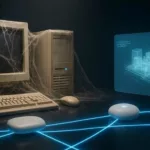One of the first creators of graphene, Professor Sir Andre Geim, has found a new use for the wonder material – distilling alcohol.

His University of Manchester team has established that graphene-based membranes are impermeable to all gases and liquids – except for water, which evaporates through them as quickly as if the membranes were not there at all.
Now, the scientists have examined membranes from a derivative of graphene called graphene oxide – essentiallythe same graphene sheet, but randomly covered with other molecules such as hydroxyl groups OH-.
The researchers prepared laminates of graphene oxide sheets, and used them to seal a metal container. Even the most sensitive equipment was unable to detect air or any other gas, including helium, to leak through, they say.
So it came as a complete surprise when the researchers tried the same with ordinary water, and found that it evaporated without noticing the graphene seal.
Indeed, Water molecules evaporated through the graphene-oxide membranes at the same speed, whether the container was sealed or completely open.
“Graphene oxide sheets arrange in such a way that between them there is room for exactly one layer of water molecules. They arrange themselves in one molecule thick sheets of ice which slide along the graphene surface with practically no friction,” explains Dr Rahul Nair, who led the experimental work.
“If another atom or molecule tries the same trick, it finds that graphene capillaries either shrink in low humidity or get clogged with water molecules.”
At this point, the team had a bright idea.
“Just for a laugh, we sealed a bottle of vodka with our membranes and found that the distilled solution became stronger and stronger with time. Neither of us drinks vodka but it was great fun to do the experiment”, says Nair.
The scientists say they don’t necessarily expect distilleries to start using graphene, but say there are bound to be applications exploiting this selective removal of water.
The new discovery adds to the strange properties found in graphene. It’s the thinnest known material in the universe and the strongest ever measured. It conducts electricity and heat better than any other material.
“Helium gas is hard to stop. It slowly leaks even through a millimetre -thick window glass but our ultra-thin films completely block it. At the same time, water evaporates through them unimpeded,” says Geim.
“Materials cannot behave any stranger. You cannot help wondering what else graphene has in store for us”.






